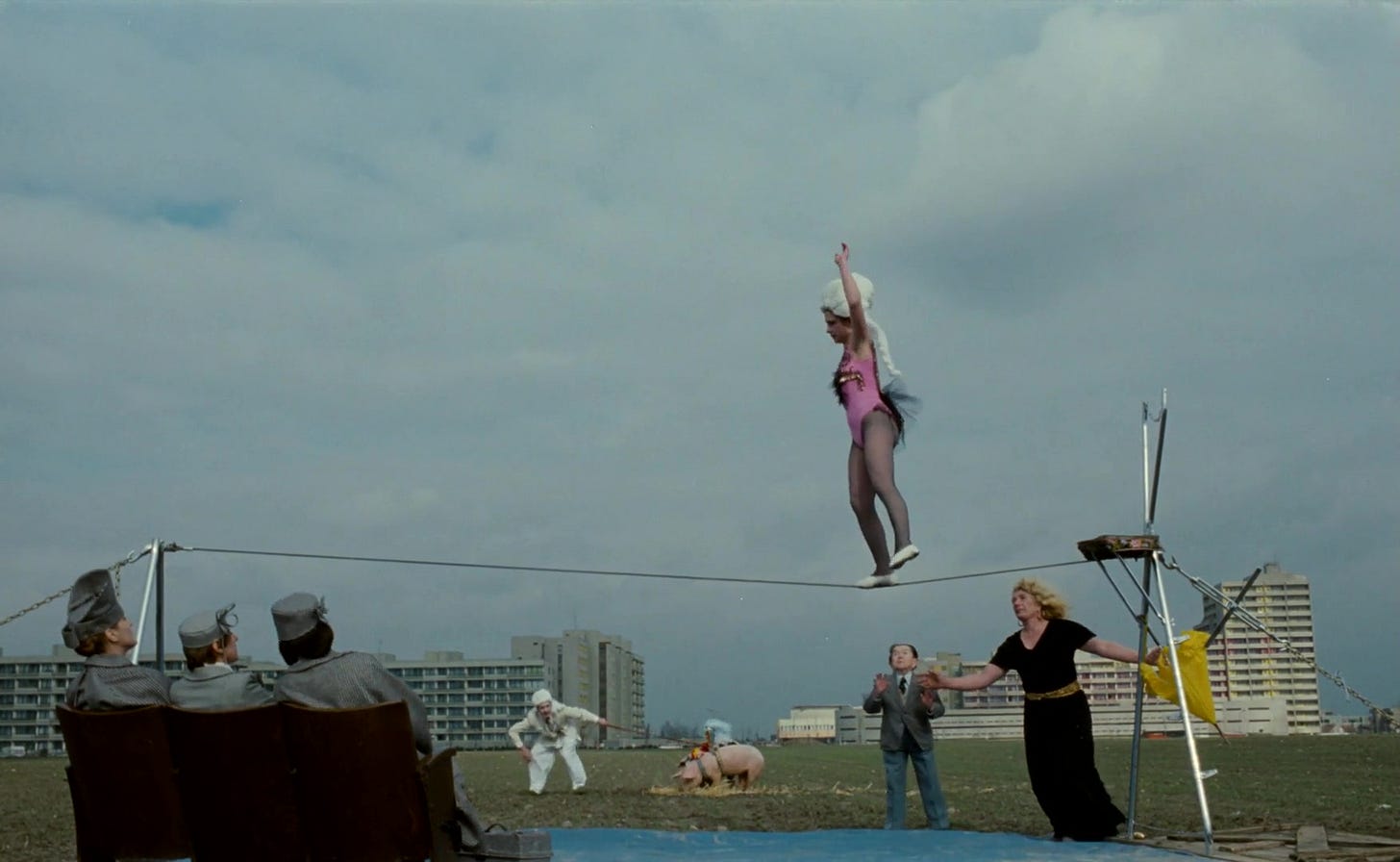◡◶▿ AMAT06 | Mistakeism
🤕 Let your mistakes transport you to another dimension. Plus: David Oreilly, Fracto, money, child failure, Musk. | Advanced Amateury Week 06
Welcome, welcome, for another dose of ‘clumsy loving in the age of competent content.’ Do you remember what we learned in last week’s lesson, Imperfections?
The imperfectionist nurtures imperfections in her work - but is exacting over the imperfections she’ll allow to prevail.
Imperfectionism takes care and hard work because the imperfectionist doesn’t know what she’s trying to do until she’s done it.
This does not make life easy for the imperfectionist’s crew, who may struggle to know how to get things wrong.
One solution is to create mythologies around your production: meta-crew lore that acts as a ‘sandbox’ for the cultivation of imperfections that hit right.
You’ll recall that I said we might talk about Hollis Frampton this week. I also said I might be wrong. The second thing is correct.
I have restructured a little to lighten this week’s load. But beware! Over the next three weeks, we will be thorough in our examination of categories of imperfection: this week mistakes, then error, and then accidents. These distinctions are important if you are serious about mastering incompetence.
Missed a week? Joined late? Don’t worry about reading these lessons out of order. Each functions independently. They are sent in a sensible sequence but hardly reliant on it.
Now! This week:
✨ Mistakes are your fault. Errors are your universe’s fault.
🍔 Your mistakes are jam-packed with nutritious value - and it’s all free.
🏦 The mistakeist strategises around the inevitability of mistakes and may generate new ones - again, at no extra expense to the producer.
📰 Accidents and AI; a fund for so-called early career Londoners; failure.
Okay. Let’s start the class.
Error or mistake
You can hear me deliver this lesson by scrolling up to the header and clicking Listen and/or the play ▸ button.
A bold word or phrase indicates that an instruction of the same name and concept will appear later in this module.
An error is a wrongness committed for want of a rightness; a flaw, a fly in the machine.
But a mistake is a slip, a lapse; something you get wrong though you’re equipped to get it right. An action you know how to do but during which you mis-step.
The error tends to be structural. It is embedded in the system. For example, a camera whose software glitches or a filmmaker who discovers their footage doesn’t “fit” because they’d never heard of the so-called 180-degree rule.
The mistake is organic. It sprouts from the human. For example, the camera operator who trips because she misjudges the step. The actor who fluffs an easy line.
You may feel anger or frustration at an error; loathing or guilt at a mistake. And that’s okay!
These emotions have value. But they needn’t be your “go-to” emotions for moments of error or mistake. An error or mistake itself is loaded with value. An authentic mistake carries a motherlode of potential. Potential that is impossible to access via conventional means (nor by faking a mistake event).
You might feel fascination with an error or love and warm humility at a mistake; either may amuse or charm you. And the best leave you in awe. An error or mistake can expose truths deeper than those bared by the skilful and accurate execution of the intended mark or gesture.
There is some overlap between the error and the mistake. And each may occasion to become a subset of the other. The words are often used interchangeably, particularly during:
a very hot or very cold shoot, or
one in which the effects of gravity seem more pronounced than usual, or
there is something else bothering everybody.
And that’s okay; it’s all a mess, anyway. But sometimes it’s helpful to remember that both errors and mistakes are available, and each have their particular benefits.
We certainly can’t assume that when somebody says “error” or “mistake” in the wild, they have chosen the correct word. Nor that the distinction is absolutely correct in the preceding paragraphs.
Mistakes value
The mistakeist↓ filmmaker may incorporate production flaws, performance slips, or other creative blunders into her movie. She includes them because she believes that these mistakes add value to the work (individually or collectively.)
Value? The value that mistakes add to a movie tends to be counter-intuitive. Or at least unexpected or disruptive. The quality imperative makes sure of that. The quality imperative refers to the pressure to be neat, skilled, regular, and stable. The cultural convention is to consider “mistakes” to be waste matter, outside the realm of quality and of little or no value. Wrong again, cultural convention!
We are not talking about the kind of value you get by wisely burying gold bars in your garden ahead of a societal collapse. (However, it is the nature of mistakes that occasionally, you may trip and fall on a nugget). The value may be aesthetic (but never neat). Or it may be meaningful (though rarely trite; of course, if it is, the filmmaker needn’t keep it).
It is in the nature of mistakes that their true value often goes unnoticed or unappreciated by most of its witnesses. Well. Hardly a reason for the filmmaker to suppress her love for this mistake or that. Hardly a reason to stop making mistakes!
Heads-up: there’s no exercise this week. Some reading and personal reflection time instead. But that’s still a bit further down, after the rest of the learning.
Mistakeism
A mistake is a slip; something you get wrong though you’re equipped to get it right. A mistake is an action whose execution you know well (or believe you do) but during which you slip, trip, blunder, or veer.
Mistakeism can be a tendency or a technique. Or somewhere on the spectrum between the two. The mistakeist deliberately includes mistakes as a structural or decorative element of her work. A mistakeist filmmaker, then, may include production flaws, performance slips, or other bloopers in the audio-visual and narrative materials. She includes them because she believes that, individually or collectively, these mistakes add value to her movie.
Okay! We found a secret source of odd value. But mistakeism is not as straightforward as making mistakes “accidentally on purpose.” To paraphrase Tori Kudo, a mistake made on purpose undoes its own meaning.
Mistakes happen. But if the crew knows what they’re supposed to be doing, and if they’re talented, practiced, or lucky, they may not make any mistakes at all. So, how can they tap into that secret added value of the accidental mistake?
By setting up the conditions to fail. The mistakeist learns not just to recognise but to cultivate the valuable mistake. Make yourself dizzy! Set yourself targets that you can’t possibly reach (but try very hard to hit them)! Establish fuzzy myths! Find a reason to build a set that’s two sizes two small for your actors. (There has to be a reason. A reason in the narrative or meta-narrative of the movie). Collaborate with wild things.
A one-take rule makes for a repairman’s cinema.
What will you do with your mistakes? The -ism, the -ist, in ‘mistakeism’ suggest you’ll position your mistakes with a framework or philosophy.
Mistakes as meteorology.
Mistakes as glyphs.
The slipstream mistakeist↓ cultivates mistakes as a structural (or rather, rhizomatic) blueprint (or rather, sprouts) for their scene or movie. (Or production). But that’s another story.
For example.
A mistakeist may revel in the freedom to sprinkle mistakes across her work with wild abandon. Or, with love and tolerance, she may allow mistakes to flourish freely through her work as they occur.
Another mistakeist may also be an imperfectionist if she is constitutionally unable to keep any but the most carefully vetted mistakes. From the opposite point of view, an imperfectionist may well be a mistakeist, too; it depends what kind of imperfections she likes. (Cf. Imperfectionism).
Slipstream mistakeism
You have a choice.
When you make a mistake while writing or editing, or - more dynamically - while filming, you can:
Fix it (unmistake it or omit it).
Keep it in (as a cheap, isolated instance of odd value.)
But there is a third way.
A mistake can be a half-closed sewer hole that you lever open. Or which - unattended - stretches and gapes until filmic matter falls through. The film’s very current could get sucked through or at least distorted. Slipstream mistakeism of this kind permits wild and uncultured truths to flourish along divergent paths.
In practice: a particular mistake becomes the narrative, grammatical, or technical norm from the moment it occurs. The mistake drags the remainder of the story, the aesthetic, or the production in its direction. For example: the (continuity) mistake or non-sequitur as a narrative portal that sends your hero - and her actor - off on a whole different adventure to that which is listed in the synopsis.
(There is a fourth way: recoil mistakeism. When you jolt back from a mistake a little too hard and don’t stop recoiling until the film is done.)
Please share your thoughts and queries from this week’s lesson in the comments.
Field work: David Oreilly, Fracto, money, child failure, Musk
🏭 Here’s David OReilly [sic!] addressing mistakes + AI in one of his Reminders. OReilly argues that:
we “prize accidents because they emerge from outside our will and take us to destinations we wouldn’t otherwise go” and
“AI’s strength is offering an enormous "accident space": a dimension of plausible, potential variations on an intention” but
“long term adaptive response to AI is likely to lead to unimaginably beautiful art and powerful affirmations of humanity, as well as widespread job disruption and the atrophying of fundamental human skills.”
Enormous accident space!
I spoke with a dad about this at the weekend (without the mistake-talk): that we would all be out of a job. And, at best, left sitting on the sofa, collecting our Universal Basic Income (robot redundancy payout), eating crisps.
Zoom out: we were standing in the sun in a sandpit. Watching dozens of children hard at work, variously building, burying, ferrying, battling, or otherwise constructing and/or deconstructing their environment and reality. It suddenly felt very odd to be talking about this flat, cerebral, elsewhere-factory space. Nothing against AI - it’s useful, revolutionary, inevitable. But this wasn’t the same planet.
There may always be crisp-eaters - I have my moments, myself, but never on campus - but there may be fewer crisp-eaters if only we can find a way to use this robot revolution to afford us a few more mistakes and quit educating the sandpit mentality out of the young’uns.
💵 Fracto Experimental Film Encounter in Berlin is crowdfunding for its very survival. Send them money. Get a tote to let your neighbourhood shopkeepers know the kind of person you are and help strike up conversations on benches.
🔥 Statistically, the average UPV student probably doesn’t live in London. But , those who do, or who can fake it, and who are in the early stages of their career, might spend this week applying for the FLAMIN Fellowship 2023-2024 programme (deadline 30th May 2023.) I mean, it’s all ‘early career’ until it ends, right?
🚍 And the London Transport Museum is holding a ‘Failure is your friend’ workshop that is apparently “suitable for children aged 7 and above.” I didn’t look into the details, but this seems refreshingly candid. Why leave those seven-year-olds in a state of delusion? Take your seven-year-old along and then keep them out of school for a week to process what they’ve seen.
📢 Elon Musk is suppressing our tweets. Suppressing our tweets! If this lesson was of any value to you, please help the school to flourish: forward this message to someone who’ll appreciate it and share the link far and wide.
Next week we’ll learn about error and there will be zero Frampton content - guaranteed.
Class dismissed,
~Graeme Cole.
(Principal)
🐦 Twitter | 📸 Instagram | 🎞️ Letterboxd | 🌐 Website












